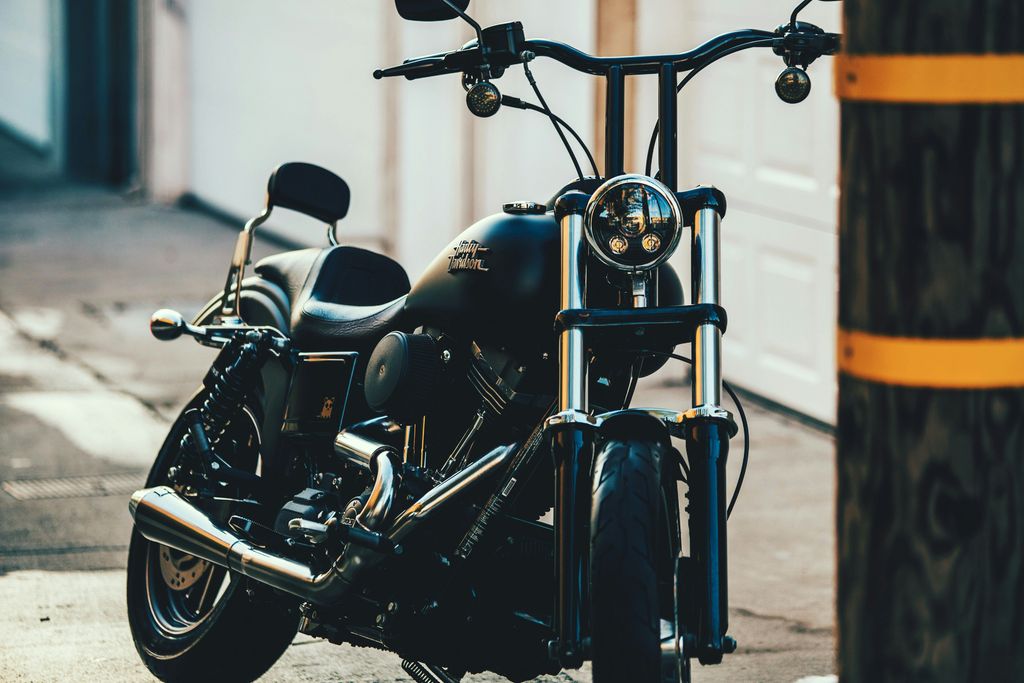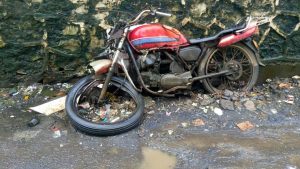Salvage motorcycles offer motorcycle enthusiasts the opportunity to find great deals on bikes that they may not be able to afford otherwise. These motorcycles have salvage titles, indicating that they have been in accidents and have damage that insurance companies did not want to repair. However, buying salvage motorcycles comes with its own set of benefits. Here are the key takeaways:
Key Takeaways
- Salvage motorcycles can be purchased at a lower price compared to their non-salvage counterparts.
- Buying salvage motorcycles allows enthusiasts to restore and customize the bike according to their preferences.
- Salvage motorcycles can be a great option for those looking for project bikes or spare parts.
- With proper research and inspection, it is possible to find salvage motorcycles with minimal damage and repair costs.
- Buying salvage motorcycles can be a rewarding experience for motorcycle enthusiasts who enjoy the restoration process.
Understanding Salvage Motorcycles

What are Salvage Motorcycles?
Salvage motorcycles are motorcycles that have been deemed a total loss by an insurance company due to damage from an accident, natural disaster, or other reasons. These motorcycles are typically sold at a significantly lower price compared to their market value, making them a great option for motorcycle enthusiasts looking for affordable and unique bikes. While salvage motorcycles may require some repairs and restoration work, they offer the opportunity to own a high-quality bike at a fraction of the cost.
How Salvage Motorcycles are Classified
When it comes to salvage motorcycles, understanding how they are classified is essential. Salvage motorcycles are categorized based on the extent of damage they have sustained. These classifications help buyers determine the level of repair needed and the potential value of the motorcycle. The most common classifications include:
- Salvage Title: This classification is given to motorcycles that have been deemed a total loss by an insurance company. These motorcycles have significant damage and may require extensive repairs.
- Rebuilt Title: A motorcycle with a rebuilt title has been repaired and restored to a roadworthy condition. While it may have had significant damage in the past, it has since been repaired and is now considered safe to ride.
- Parts Only Title: Motorcycles with a parts only title are typically not roadworthy and are only suitable for selling parts. These motorcycles have extensive damage and are not intended to be repaired and ridden.
Understanding these classifications can help buyers make informed decisions when purchasing salvage motorcycles.
Benefits of Buying Salvage Motorcycles
Buying salvage motorcycles can offer great deals on a bike you otherwise couldn’t afford. The catch is that a salvage title usually means it’s been in an accident and has damage the insurance company didn’t want to bother fixing. However, if you’re willing to put in the time and effort, restoring a salvage motorcycle can be a rewarding project. Here are some reasons why buying salvage motorcycles can be a smart choice:
- Affordability: Salvage motorcycles are often priced significantly lower than their market value, allowing you to save money.
- Customization: Restoring a salvage motorcycle gives you the opportunity to customize it according to your preferences.
- Learning Experience: Restoring a salvage motorcycle can be a great learning experience, allowing you to gain valuable knowledge about motorcycle mechanics and repair.
- Unique Selection: Salvage motorcycles offer a unique selection of models and brands that may not be easily available in the market.
If you’re considering buying a salvage motorcycle, it’s important to carefully evaluate the extent of damage, estimate repair costs, and check for any legal issues before making a decision. Additionally, it’s recommended to research the motorcycle’s history, thoroughly inspect the motorcycle, and seek a professional opinion to ensure you make an informed purchase.
Factors to Consider Before Buying a Salvage Motorcycle

Determining the Extent of Damage
When considering buying a salvage motorcycle, it is crucial to determine the extent of damage. This will help you assess the feasibility of repairs and estimate the overall cost involved. Inspect the motorcycle thoroughly, paying close attention to areas such as the frame, engine, suspension, and electrical components. Look for signs of major damage, such as bent or cracked parts, rust, or water damage. Additionally, evaluate the condition of the tires, brakes, and other essential components. By carefully assessing the extent of damage, you can make an informed decision about whether the salvage motorcycle is worth investing in.
Evaluating Repair Costs
When considering the purchase of a salvage motorcycle, one of the crucial factors to evaluate is the repair costs. Repair costs can vary significantly depending on the extent of the damage and the specific repairs needed. It is important to carefully assess the condition of the motorcycle and estimate the cost of repairs before making a decision.
Here are some key points to consider when evaluating repair costs:
- Extent of Damage: Determine the extent of the damage and identify any major repairs that may be required. This will help you estimate the overall cost of repairs.
- Parts and Labor: Consider the cost of replacement parts and the labor required for repairs. Research the availability and prices of the necessary parts to get an accurate estimate.
- Specialized Repairs: Some salvage motorcycles may require specialized repairs, such as frame straightening or engine rebuilding. These repairs can be more expensive and should be taken into account.
It is essential to thoroughly evaluate the repair costs to ensure that the investment in a salvage motorcycle is financially viable. By carefully assessing the repair costs, you can make an informed decision and potentially save money in the long run.
Tip: Before finalizing the purchase, consult with a professional mechanic or motorcycle expert to get their opinion on the repair costs and feasibility of restoring the salvage motorcycle.
Checking for Legal Issues
When buying a salvage motorcycle, it is crucial to thoroughly check for any potential legal issues. This includes verifying the ownership status, ensuring that there are no liens or outstanding loans on the motorcycle, and confirming that the motorcycle has not been reported stolen. Legal issues can cause significant problems down the line, so it is important to take the time to research and investigate the motorcycle’s history.
To help you in this process, here are some steps you can take:
- Request a vehicle history report to check for any reported accidents, title issues, or other red flags.
- Contact the local Department of Motor Vehicles to verify the motorcycle’s registration status and obtain any necessary paperwork.
- Consult with a legal professional or an expert in salvage motorcycles to ensure that you are aware of any specific legal requirements or restrictions.
Remember, addressing any potential legal issues upfront can save you time, money, and headaches in the future. It is always better to be proactive and thorough in your research before making a purchase.
Steps to Take When Buying a Salvage Motorcycle

Researching the Motorcycle’s History
When buying a salvage motorcycle, it is crucial to thoroughly research its history. This will provide valuable insights into the motorcycle’s past, including any previous accidents, repairs, or modifications. By obtaining a detailed history report, you can make an informed decision and assess the extent of damage. Look for reputable sources that offer comprehensive VIN history reports, which provide a detailed record of the motorcycle’s ownership, maintenance, and any reported incidents. Knowledge is power, and by understanding the motorcycle’s history, you can better evaluate its condition and potential for restoration.
Inspecting the Motorcycle
When inspecting a salvage motorcycle, it is crucial to pay attention to every detail. Start by examining the overall condition of the bike, looking for any signs of damage or wear. Check the frame for any signs of bending or cracking, as this could indicate a serious accident. Inspect the engine and other mechanical components to ensure they are in good working order. It is also important to check the electrical system, including the lights, indicators, and horn. Finally, take the bike for a test ride to assess its performance and handling. By thoroughly inspecting the motorcycle, you can make an informed decision about its condition and whether it is worth restoring.
Getting a Professional Opinion
After conducting thorough research and inspecting the salvage motorcycle, it is highly recommended to seek a professional opinion before making a purchase. A professional mechanic or motorcycle expert can provide valuable insights into the condition of the motorcycle and the feasibility of repairs. They can assess the extent of the damage, evaluate the repair costs, and identify any potential hidden issues that may not be apparent to an untrained eye. Their expertise can help you make an informed decision and ensure that you are investing in a salvage motorcycle that is worth restoring. Additionally, they can offer guidance on the best restoration practices and provide recommendations for sourcing quality parts. By consulting with a professional, you can have peace of mind knowing that you are making a wise investment in a salvage motorcycle that has the potential to be restored to its former glory.
Tips for Restoring Salvage Motorcycles

Creating a Restoration Plan
When it comes to restoring salvage motorcycles, having a solid restoration plan is crucial. Planning out the entire process before starting any work will help ensure a smooth and successful restoration. Here are some tips to consider:
-
Assess the Damage: Begin by thoroughly inspecting the motorcycle and identifying all areas that need repair or replacement.
-
Create a Budget: Determine how much you are willing to spend on the restoration and allocate funds accordingly.
-
Research Parts: Find reputable sources for quality replacement parts that are compatible with your motorcycle.
-
Prioritize Safety: Make sure to prioritize safety by wearing appropriate protective gear and following proper safety procedures throughout the restoration process.
-
Take Your Time: Restoring a salvage motorcycle takes time and patience. Don’t rush the process and take the necessary time to ensure each step is done correctly.
-
Seek Professional Help: If you are unsure about any aspect of the restoration or if you lack the necessary skills, don’t hesitate to seek professional help.
Remember, restoring a salvage motorcycle can be a rewarding experience, but it requires careful planning and attention to detail.
Sourcing Quality Parts
When it comes to restoring salvage motorcycles, finding quality parts is crucial. Here are some tips to help you source the right components:
- Research online: Utilize online platforms and forums dedicated to motorcycle enthusiasts to find reputable sellers and suppliers of salvage motorcycle parts.
- Visit salvage yards: Explore local salvage yards and auto recycling centers to discover hidden gems and unique parts for your motorcycle.
- Connect with other enthusiasts: Join motorcycle clubs and communities to network with fellow enthusiasts who may have spare parts or know where to find them.
Remember, using genuine and high-quality parts ensures the longevity and performance of your restored salvage motorcycle.
Pro Tip: When purchasing used parts, always inspect them thoroughly for any damage or wear to ensure they are in good condition.
Ensuring Proper Safety Measures
When it comes to restoring salvage motorcycles, safety should always be a top priority. Here are some important steps to take to ensure the safety of yourself and others:
- Wear protective gear: Always wear a helmet, gloves, and appropriate riding gear to protect yourself in case of an accident.
- Inspect the frame: Before starting any restoration work, thoroughly inspect the frame of the motorcycle to ensure it is structurally sound.
- Check the brakes: Make sure the brakes are in good working condition and replace any worn-out brake pads or discs.
- Test the electrical system: Check all the electrical components, such as lights, turn signals, and horn, to ensure they are functioning properly.
- Verify the tires: Inspect the tires for any signs of wear or damage and replace them if necessary.
Remember, taking the necessary safety precautions will not only protect you but also enhance the overall riding experience.
Selling Salvage Motorcycles

Preparing the Motorcycle for Sale
Once you have completed the restoration process and your salvage motorcycle is in top condition, it’s time to prepare it for sale. This involves ensuring that all necessary paperwork is in order, including the title and registration. Additionally, you should thoroughly clean the motorcycle to make it look its best for potential buyers. Highlight: smooth transaction
Marketing and Advertising Strategies
When it comes to marketing and advertising your salvage motorcycle for sale, there are a few key strategies to keep in mind. First and foremost, it’s important to highlight the unique selling points of your motorcycle. Whether it’s a rare model, a custom build, or a bike with low mileage, make sure to emphasize what sets it apart from the rest. Additionally, utilizing online platforms and social media can greatly expand your reach and attract potential buyers. Creating high-quality photos and videos of your motorcycle can also help showcase its features and condition. Lastly, don’t underestimate the power of word-of-mouth. Spread the word among your motorcycle enthusiast friends and local riding communities to increase your chances of finding the right buyer.
Negotiating the Selling Price
When it comes to negotiating the selling price of a salvage motorcycle, there are a few key factors to consider. First and foremost, it’s important to do your research and have a clear understanding of the market value for similar motorcycles in similar conditions. This will give you a starting point for your negotiations.
Additionally, it’s crucial to thoroughly inspect the motorcycle and take note of any repairs or maintenance that may be needed. This information can be used as leverage during the negotiation process.
Furthermore, be prepared to make a reasonable offer based on the condition of the motorcycle. Keep in mind that salvage motorcycles are sold "as is," so it’s important to factor in any potential repair costs.
Lastly, don’t be afraid to negotiate with the seller. Be polite but firm in your negotiations, and be willing to walk away if the price is not right. Remember, the goal is to get the best deal possible while ensuring that the motorcycle meets your needs and expectations.
Are you looking to buy salvage motorcycles? Look no further! SalvageBikesAuction.com is your one-stop destination for salvage motorcycles for sale. With over 150,000 salvaged vehicles available, we have the largest inventory of repairable salvage motorcycles. Whether you’re a motorcycle enthusiast or a mechanic looking for a project, you’ll find the right salvage motorcycle for you. Visit our website today and find the perfect salvage motorcycle near you!
Conclusion
In conclusion, buying salvage motorcycles can offer motorcycle enthusiasts the opportunity to find great deals on bikes they otherwise couldn’t afford. While salvage titles may indicate previous damage, with proper inspection and repairs, these motorcycles can be restored to their former glory. SalvageBikesAuction.com provides a user-friendly platform for finding repairable salvage motorcycles of any make and model. So, if you’re looking for a project bike or a unique addition to your collection, consider exploring the world of salvage motorcycles and unlock the potential of affordable two-wheeled adventures.
Frequently Asked Questions
What are salvage motorcycles?
Salvage motorcycles are motorcycles that have been damaged and deemed a total loss by an insurance company. They are typically sold at auctions or through salvage yards.
How are salvage motorcycles classified?
Salvage motorcycles are classified based on the extent of damage they have suffered. The classifications include categories such as ‘salvage’, ‘rebuildable’, and ‘parts only’.
What are the benefits of buying salvage motorcycles?
Buying salvage motorcycles can be a cost-effective way to own a motorcycle, as they are often sold at significantly lower prices compared to their market value. Additionally, salvage motorcycles can be a great option for motorcycle enthusiasts who enjoy the challenge of restoring and customizing bikes.
How can I determine the extent of damage on a salvage motorcycle?
Before buying a salvage motorcycle, it is important to thoroughly inspect the bike for any visible damage. You can also request a professional inspection or obtain a vehicle history report to get more information about the bike’s condition.
What should I consider when evaluating repair costs for a salvage motorcycle?
When evaluating repair costs for a salvage motorcycle, you should consider the cost of parts, labor, and any additional repairs or modifications that may be needed. It is also recommended to get quotes from multiple repair shops to compare prices.
Are there any legal issues I should be aware of when buying a salvage motorcycle?
Yes, there can be legal issues involved when buying a salvage motorcycle. It is important to check if the bike has a salvage title and if there are any restrictions or requirements for registering and insuring the motorcycle in your state or country.










